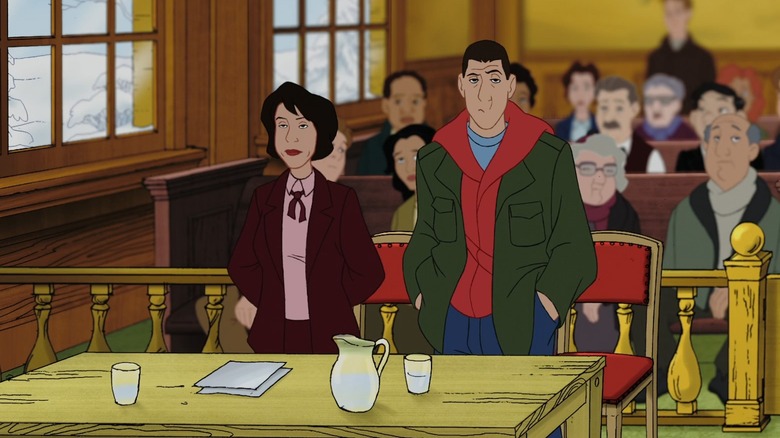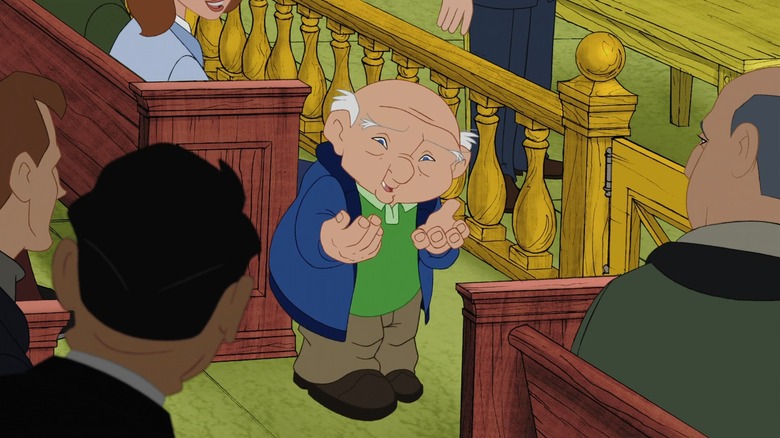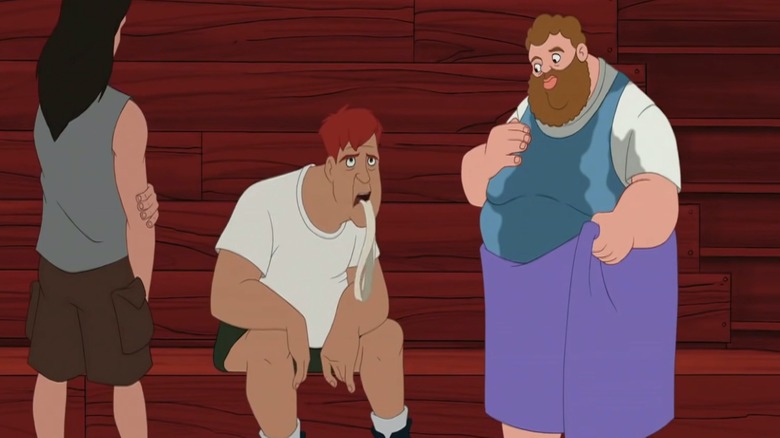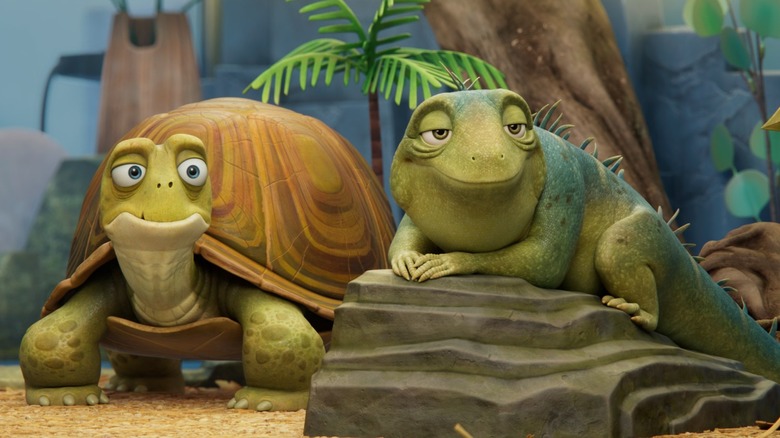Adam Sandler's Leo May Be A Netflix Success, But His First Animated Feature Bombed
The week of Thanksgiving is always a major one for moviegoers, and these days, that holds true for streaming too. Netflix typically offers up a new movie that becomes an instant hit among subscribers, and this year it was the animated Adam Sandler film "Leo." If you haven't seen the ads for "Leo," it's a musical coming-of-age comedy about an old lizard (Sandler) who becomes a mentor to fifth graders after they discover the class pet can talk. It's more likely that you have already seen this movie, though, as Netflix reports that 34.6 million people tuned in to watch it during the week of November 20th to 27, 2023.
Streamers' self-reported data is notoriously less-than-transparent, but an animated kids' movie doing huge numbers during a long weekend is a no-brainer. "Leo" also actually looks good; the smooth animation is closer to Dreamworks or Pixar style than typical Netflix fare, and Sandler reigns in his penchant for annoying voices and gross humor to deliver a story that's quite sweet. In his review, /Film's Josh Spiegel called "Leo" "very cute" and "charming," noting that it's surprisingly more low-key in its comedic energy than Sandler's popular "Hotel Transylvania" series.
Between the success of "Leo" and the box office bona fides of the "Hotel Transylvania" movies — the third of which is the highest-grossing movie of Sandler's career with a $528 million global haul — it's safe to say that Sandler's got a knack for animated fare. This is a statement that would shock anyone who's been following his career since its early days, though, as he's also still responsible for one of the most-hated animated films of all time.
Two decades ago, Sandler made a gnarly Hanukkah movie
As a kid, I was allowed to watch pretty much anything so long as it fit under the umbrella of comedy (or sci-fi, but that's a traumatizing story for another time). I grew up quoting Austin Powers and "Wayne's World" in elementary school, and frequently watched movies from Adam Sandler's Happy Madison productions, like "The Waterboy" and "Billy Madison," from a tender age, too. All of this makes the fact that my dad made my brother and I get up and leave the theater about 20 minutes into the 2002 Hanukkah film "Eight Crazy Nights" all the more remarkable.
"Eight Crazy Nights" holds a particularly loathsome spot in the history of pop culture. It's hated by many for its attempts to mix crassness and straight-up mean humor with holiday spirit, for its lackluster animation (one review called it "Nickelodeon-quality animation"), and for its obnoxious lead — a misanthropic deadbeat Sandler character who hits rock bottom and keeps going. Like "Leo," "Eight Crazy Nights" was released right around Thanksgiving, but even 20 years ago, as properties like "Jackass" and "Family Guy" were hitting big, audiences still weren't having it. The movie has a small cult following, but it reportedly didn't recoup its budget (it made $23 million and is said to have cost $34 million), and it currently sits with an abysmal 13% on Rotten Tomatoes.
Critics hated Eight Crazy Nights
Interestingly, the opening paragraphs of Roger Ebert's two-star review of the film predict the exact scenario I ended up in as an unsuspecting nearly eight-year-old. "Heaven help the unsuspecting families who wander into 'Adam Sandler's Eight Crazy Nights' expecting a jolly animated holiday funfest," Ebert wrote, before devoting much of the review to the fact that a mix of family-friendly elements and unlikeable adult humor make the movie feel like it's not really meant for anyone at all. "His comedies have included generous amounts of antisocial hostility, sudden violence, dodgy material about urination, defecation and flatulence, and a general air of defiance," Ebert wrote. He went on: "A lot of people like that. But they are not the people likely to understand the Hanukkah message in 'Eight Crazy Nights.'"
Further attempts to finish watching "Eight Crazy Nights" as an adult have proven unsuccessful, but I'll always vividly remember a few key scenes that support Ebert's point — including one where Sandler's Davey and a small child in his care force a guy to eat a sweaty jock strap. Actually, that may have been the last straw for my dad, who was asking the box office for a refund moments later. I remember this movie's body humor much more than any Hanukkah-related themes, and I don't think I'm alone in this. Ebert argued that many audiences would not be able to meet the movie where it was at when it came to its portrayal of Judaism, writing, "Considering that his popularity and the movie's holiday packaging will attract large numbers of teenage Middle Americans not necessarily familiar with Jews, does he think this is a good way to get them started?"
A more grown-up gross-out factor
As several writers have pointed out over the years, "Eight Crazy Nights" isn't just bad because it's more gross and mean than funny: the film is perhaps the most well-known Hanukkah movie ever, yet critics say it squanders its chance to portray the Jewish holidays in any meaningful way. "While Christians have a bevy of universally beloved Christmas classics to fill their hearts with yuletide cheer," Matthew Rozsa wrote in a piece for Salon in 2018, "this is pretty much the only film that is widely associated with Hanukkah." He went on to describe Sandler's character as "the kind of caricature an anti-Semite would come up with if he wanted individuals who had never met a Jew to have the worst possible impression of them."
Yet Sandler has clearly grown up, at least a little bit. Remarkably, the comedian responsible for a movie as off-putting as "Eight Crazy Nights" is now also the star (and in the case of "Hotel Transylvania 2" and "Leo," co-writer) of genuinely family-friendly fare. Sure, early Sandler fans may balk at how "safe" movies like "Leo" feel, but the guy is 57 years old: you can only laugh at the same poop jokes for so long. Or at least, they're funnier coming from a cute lizard than a grown man.
"Leo" is now on Netflix.



